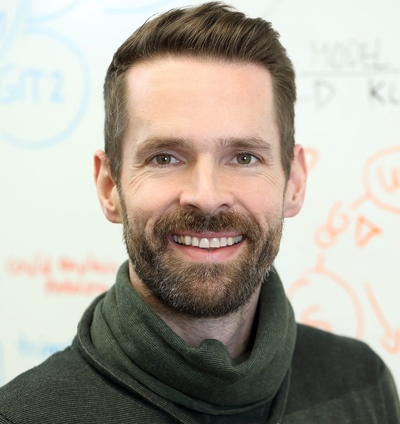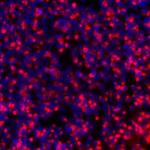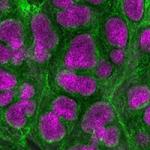
Research Topics
Mammalian development relies on the precise execution of highly coordinated cell-fate decisions by stem cells, which can undergo self-renewal, reversibly exit into a quiescent state, or terminally commit to a cell differentiation program. To orchestrate these decisions, stem cells make frequent use of ubiquitylation, an essential post-translational modification that alters the stability, activity, localization, or interaction landscape of target proteins. Our lab leverages the strength of the NIH intramural program, by combining our core expertise in human pluripotent stem cell culture, proteomics, and ubiquitin biochemistry with animal models, clinical genetics, and human disease cohorts. Our work has determined how ubiquitylation controls protein translation, cell division, and migration during differentiation and has uncovered mechanisms by which defects in ubiquitylation enzymes result in congenital diseases of impaired brain and craniofacial development or autoinflammation. We are continuing these studies to elucidate further basic principles of cell-fate specification and to provide insights into the molecular origin of human diseases, which will be useful for developing novel therapeutic approaches.
Biography
Dr. Achim Werner received his Ph.D. from the International Max Planck Research School for Molecular Biology in Göttingen, Germany. As a California Institute of Regenerative Medicine fellow, Dr. Werner then performed his postdoctoral work at the University of California, Berkeley, where he studied the role for ubiquitylation enzymes in human embryonic stem cell maintenance and differentiation. By combining mass spectrometry-based approaches with stem cell differentiation assays, biochemical techniques, and ribosome profiling, Dr. Werner’s work has elucidated a novel pathway that regulates the function of newly synthesized ribosomes to allow stem cells to adopt a neural crest cell fate during differentiation. On the basis of these findings, Dr. Werner was awarded an NIH/NIDCR K99 Pathway to Independence Award in 2015. In 2017, Dr. Werner launched his independent research program at NIDCR as Chief of the Stem Cell Biochemistry Unit. His lab combines biochemical and proteomic approaches with human pluripotent stem cell culture, clinical genetics, and human disease cohorts. This integrated approach has allowed his lab to uncover basic principles of how ubiquitylation controls cell-fate decisions during differentiation and how defects in ubiquitylation enzymes results in human diseases such as autoinflammation and developmental disorders.
Selected Publications
- Collins JC, Magaziner SJ, English M, Hassan B, Chen X, Balanda N, Anderson M, Lam A, Fernandez-Pol S, Kwong B, Greenberg PL, Terrier B, Likhite ME, Kosmider O, Wang Y, Samara NL, Walters KJ, Beck DB, Werner A. Shared and distinct mechanisms of UBA1 inactivation across different diseases. EMBO J. 2024;43(10):1919-1946.
- Asmar AJ, Abrams SR, Hsin J, Collins JC, Yazejian RM, Wu Y, Cho J, Doyle AD, Cinthala S, Simon M, van Jaarsveld RH, Beck DB, Kerosuo L, Werner A. A ubiquitin-based effector-to-inhibitor switch coordinates early brain, craniofacial, and skin development. Nat Commun. 2023;14(1):4499.
- Beck DB, Basar MA, Asmar AJ, Thompson JJ, Oda H, Uehara DT, Saida K, Pajusalu S, Talvik I, D'Souza P, Bodurtha J, Mu W, Barañano KW, Miyake N, Wang R, Kempers M, Tamada T, Nishimura Y, Okada S, Kosho T, Dale R, Mitra A, Macnamara E, Undiagnosed Diseases Network, Matsumoto N, Inazawa J, Walkiewicz M, Õunap K, Tifft CJ, Aksentijevich I, Kastner DL, Rocha PP, Werner A. Linkage-specific deubiquitylation by OTUD5 defines an embryonic pathway intolerant to genomic variation. Sci Adv. 2021;7(4).
- Beck DB, Ferrada MA, Sikora KA, Ombrello AK, Collins JC, Pei W, Balanda N, Ross DL, Ospina Cardona D, Wu Z, Patel B, Manthiram K, Groarke EM, Gutierrez-Rodrigues F, Hoffmann P, Rosenzweig S, Nakabo S, Dillon LW, Hourigan CS, Tsai WL, Gupta S, Carmona-Rivera C, Asmar AJ, Xu L, Oda H, Goodspeed W, Barron KS, Nehrebecky M, Jones A, Laird RS, Deuitch N, Rowczenio D, Rominger E, Wells KV, Lee CR, Wang W, Trick M, Mullikin J, Wigerblad G, Brooks S, Dell'Orso S, Deng Z, Chae JJ, Dulau-Florea A, Malicdan MCV, Novacic D, Colbert RA, Kaplan MJ, Gadina M, Savic S, Lachmann HJ, Abu-Asab M, Solomon BD, Retterer K, Gahl WA, Burgess SM, Aksentijevich I, Young NS, Calvo KR, Werner A, Kastner DL, Grayson PC. Somatic Mutations in UBA1 and Severe Adult-Onset Autoinflammatory Disease. N Engl J Med. 2020;383(27):2628-2638.
- Ferrada MA, Savic S, Cardona DO, Collins JC, Alessi H, Gutierrez-Rodrigues F, Kumar DBU, Wilson L, Goodspeed W, Topilow JS, Paik JJ, Poulter JA, Kermani TA, Koster MJ, Warrington KJ, Cargo C, Tattersall RS, Duncan CJA, Cantor A, Hoffmann P, Payne EM, Bonnekoh H, Krause K, Cowen EW, Calvo KR, Patel BA, Ombrello AK, Kastner DL, Young NS, Werner A, Grayson PC, Beck DB. Translation of cytoplasmic UBA1 contributes to VEXAS syndrome pathogenesis. Blood. 2022;140(13):1496-1506.
Related Scientific Focus Areas

Molecular Biology and Biochemistry
View additional Principal Investigators in Molecular Biology and Biochemistry




This page was last updated on Monday, July 1, 2024